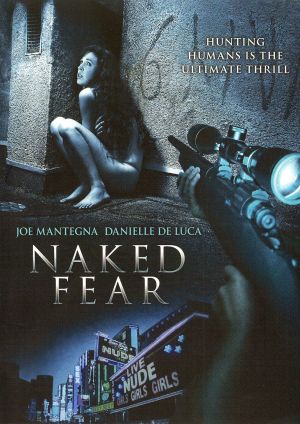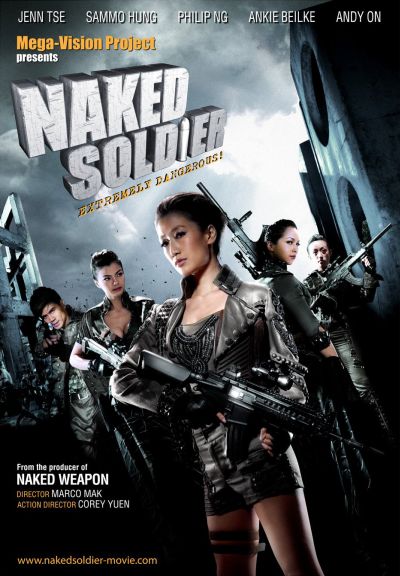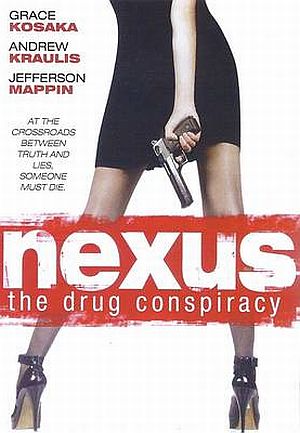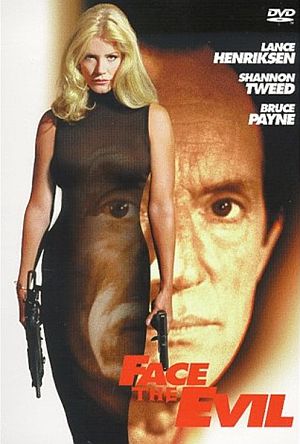★★★
“If you liked the party scene in Ms. 45, you’ll love this…”
 Surely one of the great B-movie exploitation titles of all-time, this inevitably can’t live up to the expectations that generates, though in the early going, it makes a half-decent effort. Certainly, it’s more entertaining than Guzman’s previous Run! Bitch Run!, though it does suffer from some of the same mean-spirited unpleasantness. The heroine is Sister Sarah (Ortega), who has been a long-term victim of the Catholic Church, which is portrayed here as the embodiment of just about every evil imaginable, being neck-deep in drugs, prositution and other equally-dubious activities, with their partners, the Los Muertos biker gang. Finally, Sarah has a vision from God, telling her it’s time to clean house: she starts at the bottom, and works her way up to Chavo (Castro) and Father Carlittos (D’Marco). Along the way, yes, there is no shortage of nude nuns – or other women – though, to be honest, the guns aren’t actually all that big…
Surely one of the great B-movie exploitation titles of all-time, this inevitably can’t live up to the expectations that generates, though in the early going, it makes a half-decent effort. Certainly, it’s more entertaining than Guzman’s previous Run! Bitch Run!, though it does suffer from some of the same mean-spirited unpleasantness. The heroine is Sister Sarah (Ortega), who has been a long-term victim of the Catholic Church, which is portrayed here as the embodiment of just about every evil imaginable, being neck-deep in drugs, prositution and other equally-dubious activities, with their partners, the Los Muertos biker gang. Finally, Sarah has a vision from God, telling her it’s time to clean house: she starts at the bottom, and works her way up to Chavo (Castro) and Father Carlittos (D’Marco). Along the way, yes, there is no shortage of nude nuns – or other women – though, to be honest, the guns aren’t actually all that big…
Given the title, you have a certain obvious set of expectations. This kind of thing can be enormous fun, as the likes of Machete or Hobo with a Shotgun prove. This doesn’t quite reach the same level of gleeful abandon, and while Ortega holds her own (admittedly in a role that doesn’t require much in terms of emotional breadth), the rest of the cast are acceptable at best, and painfully wooden at worst. After a high-octane and hugely-promising start, the middle section struggles much harder to keep the audience’s attention with anything other than the gratuitous nudity – it’s entirely obvious where things are heading. As in Bitch, the filling here includes some stuff which edges precariously close to rape fantasy, and if you’ve read much of this site, you’ll know that when it comes to rape-revenge movies, I like them to be firmly weighted toward the latter. There’s one particularly dubious and pointless scene of an elderly nun being assaulted, that came close to offending even my broad palate.
However, once the vengeful aspects return to being the focus, rather than Chavo, the film improves again. Though I do feel the villains could have received rather more comeuppance: their fates seem almost trivial, in comparison to what they have dished out over the course of the movie. Ortega does make an impression, and a title like this is, in many ways, entirely review-proof: anyone complaining it is sleazy and tacky, can’t have been paying much attention when they decided to watch it! At least it can’t be accused, like many B-movies, of not delivering on the sleeve’s promise.
Dir: Joseph Guzman
Star: Asun Ortega, David Castro, Aycil Yeltan, Perry D’Marco





 The concept of “hunting humans” has been popular cinematic fodder for over 80 years, since The Most Dangerous Game came out in 1932. This isn’t the first specifically to target women – the Roger Corman produced The Woman Hunt did so in the seventies – but the prey in that needed male help to accomplish much, which isn’t the case here. The heroine is Diana Kelper (DeLuca), whose new dance job turns out not to be quite as expected – she’s more or less coerced into working as a stripper, unable to leave until she pays off the debts to the man who brought her in. The only way to do that is to turn tricks on the side, but her first client is Colin Mandel (Garfield), who is interested in a longer-term relationship. Specifically, one where he can take his female victims into the remote wilderness, where they wake up, unclothed and eventually on the wrong end of a crossbow bolt or bullet. However, with Kelper, he may have bitten off more than he can chew.
The concept of “hunting humans” has been popular cinematic fodder for over 80 years, since The Most Dangerous Game came out in 1932. This isn’t the first specifically to target women – the Roger Corman produced The Woman Hunt did so in the seventies – but the prey in that needed male help to accomplish much, which isn’t the case here. The heroine is Diana Kelper (DeLuca), whose new dance job turns out not to be quite as expected – she’s more or less coerced into working as a stripper, unable to leave until she pays off the debts to the man who brought her in. The only way to do that is to turn tricks on the side, but her first client is Colin Mandel (Garfield), who is interested in a longer-term relationship. Specifically, one where he can take his female victims into the remote wilderness, where they wake up, unclothed and eventually on the wrong end of a crossbow bolt or bullet. However, with Kelper, he may have bitten off more than he can chew. The comparisons of Takigawa to Lazenby above proved appropriate in another way, both being canned after one entry playing the iconic title character, which is probably just as symptomatic of something. The replacement here as Nami Matsushima is Natsuki, who seems to go back toward a more taciturn heroine, closer to the original. But it’s, effectively, another reboot, with not even a nod to the previous entry. In this case, the heroine is a nurse, framed for her involvement in the hospital murder of a politician who was threatening to expose corrupt practices.
The comparisons of Takigawa to Lazenby above proved appropriate in another way, both being canned after one entry playing the iconic title character, which is probably just as symptomatic of something. The replacement here as Nami Matsushima is Natsuki, who seems to go back toward a more taciturn heroine, closer to the original. But it’s, effectively, another reboot, with not even a nod to the previous entry. In this case, the heroine is a nurse, framed for her involvement in the hospital murder of a politician who was threatening to expose corrupt practices. Just goes to show that the “cinematic reboot” is not a 21st-century invention, e.g. Batman or James Bond. For a mere three years after Meiko Kaji showed her sting as Nami, the studio reset the series, giving it a new director, new (and much more talkative) lead actress, and returning Nami Matsushima to a happy, criminal record-free young women, with a loving boyfriend. Except, of course, he turns out not to love her quite as much. Things start to collapse after her sister uncovers evidence of major government corruption, and passes it to Nami, shortly before being kidnapped. After Nami uncovers the truth – her sister is killed and she is framed for the murder, with the help of her boyfriend, and sentenced to 15 years in prison. Initially an easy mark for the tough girls in her cell, Nami soon develops her mean streak. And she’s going to need it, because the politician behind it all is looking to tidy up the loose end she represents, by killing her and making the death look like a suicide. Name turns the tables, in incendiary fashion, and it’s clear that she’s one loose end that won’t be quietly disposed of.
Just goes to show that the “cinematic reboot” is not a 21st-century invention, e.g. Batman or James Bond. For a mere three years after Meiko Kaji showed her sting as Nami, the studio reset the series, giving it a new director, new (and much more talkative) lead actress, and returning Nami Matsushima to a happy, criminal record-free young women, with a loving boyfriend. Except, of course, he turns out not to love her quite as much. Things start to collapse after her sister uncovers evidence of major government corruption, and passes it to Nami, shortly before being kidnapped. After Nami uncovers the truth – her sister is killed and she is framed for the murder, with the help of her boyfriend, and sentenced to 15 years in prison. Initially an easy mark for the tough girls in her cell, Nami soon develops her mean streak. And she’s going to need it, because the politician behind it all is looking to tidy up the loose end she represents, by killing her and making the death look like a suicide. Name turns the tables, in incendiary fashion, and it’s clear that she’s one loose end that won’t be quietly disposed of. From the director of Alien vs. Ninja, the story here centres on a pair of ninjas, Shimotsuki and Hyotsuki, who are carrying on what appears to be a family tradition, kidnapping women from other clans’ villages, and taking them back to their own for nefarious purposes – let’s just say, the phrase “tools of pleasure” crops up on more than one occasion. They ar returning with their latest batch of four, including Kisaragi (Takeda), who is a ninja in her own right. With the help of a mysterious man (Sato), Kisuragi and her colleagues in imprisonment are released from their bondage – but that is only the first obstacle between them and their freedom. Of course, it turns out the heroine is not quite as innocent as she appears, and has an agenda of her own, because her mother was kidnapped by the same sleazy ninjas, when Kisuragi was just a baby.
From the director of Alien vs. Ninja, the story here centres on a pair of ninjas, Shimotsuki and Hyotsuki, who are carrying on what appears to be a family tradition, kidnapping women from other clans’ villages, and taking them back to their own for nefarious purposes – let’s just say, the phrase “tools of pleasure” crops up on more than one occasion. They ar returning with their latest batch of four, including Kisaragi (Takeda), who is a ninja in her own right. With the help of a mysterious man (Sato), Kisuragi and her colleagues in imprisonment are released from their bondage – but that is only the first obstacle between them and their freedom. Of course, it turns out the heroine is not quite as innocent as she appears, and has an agenda of her own, because her mother was kidnapped by the same sleazy ninjas, when Kisuragi was just a baby.
 Ten years after Maggie Q got her career as an action heroine kickstarted with Weapon, and twenty after Killer rampaged its way into cult status, Jennifer Tse takes over – bearing more than a passing resemblance to her predecessor, I think. I think it’s kinda cool how the series gets revisited every decade, regular as clockwork: maybe famed producer Wong Jing has a house payment to make or something? Admittedly, there’s not much more than a tangential connection between the entries; three different directors, three different stars, and not much overlap in terms of plot. However, they still share a common approach, fetishising the female form and the act of assassination, with no shortage of style, and are the longest-running (in terms of years) GWG series around.
Ten years after Maggie Q got her career as an action heroine kickstarted with Weapon, and twenty after Killer rampaged its way into cult status, Jennifer Tse takes over – bearing more than a passing resemblance to her predecessor, I think. I think it’s kinda cool how the series gets revisited every decade, regular as clockwork: maybe famed producer Wong Jing has a house payment to make or something? Admittedly, there’s not much more than a tangential connection between the entries; three different directors, three different stars, and not much overlap in terms of plot. However, they still share a common approach, fetishising the female form and the act of assassination, with no shortage of style, and are the longest-running (in terms of years) GWG series around.
 When we last saw Nikita (Q), she’d gained some help for her struggle against Division in the shape of fellow defectors from the organization, Michael (West) and tech guy Birkhoff. But she’d lost protege Alex (Fonseca), who had stayed with Division to further her lust for revenge on those who’d killed her parents, while reclaiming her family fortune. Meanwhile, Nikita’s nemesis and former boss Percy had been usurped by Amanda (Clarke), and was now in a plexiglass box in the basement. Throw in Oversight, the government committee supposedly in charge of Division under Senator Madeline Pierce; CIA agent Ryan Fletcher and Pierce’s son Sean, who join Team Nikita; Owen, a rogue guardian, keeper of one of Percy’s black boxes… And I haven’t even got to Michael’s love-child, a source of much angst for all concerned.
When we last saw Nikita (Q), she’d gained some help for her struggle against Division in the shape of fellow defectors from the organization, Michael (West) and tech guy Birkhoff. But she’d lost protege Alex (Fonseca), who had stayed with Division to further her lust for revenge on those who’d killed her parents, while reclaiming her family fortune. Meanwhile, Nikita’s nemesis and former boss Percy had been usurped by Amanda (Clarke), and was now in a plexiglass box in the basement. Throw in Oversight, the government committee supposedly in charge of Division under Senator Madeline Pierce; CIA agent Ryan Fletcher and Pierce’s son Sean, who join Team Nikita; Owen, a rogue guardian, keeper of one of Percy’s black boxes… And I haven’t even got to Michael’s love-child, a source of much angst for all concerned. If you’re going to use a cover like this, you’d better live up to it, even if we can forgive the heels as artistic license. And while not a complete lie, this takes far too long to deliver, and comes up short of expectations. Holly (Kosaka) is a nightclub singer, separated from her husband, who got custody of their daughter due to a DUI Holly got, with the daughter in the car. On arrival at his house to pick up their child for a scheduled visit, she finds him missing – and a gun in the basement, along with a case of drugs. She calls the police, but ends up getting arrested after the police find her husband’s body, and her fingers on the murder weapon, which has mysteriously moved from the basement to the scene of the crime. The drugs have also vanished; while held in jail over the weekend, Holly gets a visit from their owner, who busts her out and insists she return with him and his thugs to the house to show her where they are. Can she escape their grasp, rescue her daughter and find out who the real murderer was?
If you’re going to use a cover like this, you’d better live up to it, even if we can forgive the heels as artistic license. And while not a complete lie, this takes far too long to deliver, and comes up short of expectations. Holly (Kosaka) is a nightclub singer, separated from her husband, who got custody of their daughter due to a DUI Holly got, with the daughter in the car. On arrival at his house to pick up their child for a scheduled visit, she finds him missing – and a gun in the basement, along with a case of drugs. She calls the police, but ends up getting arrested after the police find her husband’s body, and her fingers on the murder weapon, which has mysteriously moved from the basement to the scene of the crime. The drugs have also vanished; while held in jail over the weekend, Holly gets a visit from their owner, who busts her out and insists she return with him and his thugs to the house to show her where they are. Can she escape their grasp, rescue her daughter and find out who the real murderer was? In many ways, this is a shameless rip-off of a shameless rip-off, trying to recapture the success of the original. It’s not quite as successful, lacking the gleeful sense of energy which help its predecessor overcome its (obvious) limitations. Once more, Tweed plays action actress Sharon Bell, this time filming her latest work in Eastern Europe. She arranges for the film to do some location work in a gallery owned by sister, Bobbi (Heitmeyer), which is just about to open an exhibition, showcasing artefacts that were looted by the Nazis in World War II. The gallery is taken over by Eric Dane (Henriksen) and his crew, who seal the place off from the outside world, intent in stealing a lethal German nerve agent hidden in the base of one of the sculptures. Unfortunately, inside at the time are both sisters, along with the movie director Jack Terry (Payne), who is scouting the place out.
In many ways, this is a shameless rip-off of a shameless rip-off, trying to recapture the success of the original. It’s not quite as successful, lacking the gleeful sense of energy which help its predecessor overcome its (obvious) limitations. Once more, Tweed plays action actress Sharon Bell, this time filming her latest work in Eastern Europe. She arranges for the film to do some location work in a gallery owned by sister, Bobbi (Heitmeyer), which is just about to open an exhibition, showcasing artefacts that were looted by the Nazis in World War II. The gallery is taken over by Eric Dane (Henriksen) and his crew, who seal the place off from the outside world, intent in stealing a lethal German nerve agent hidden in the base of one of the sculptures. Unfortunately, inside at the time are both sisters, along with the movie director Jack Terry (Payne), who is scouting the place out. An almost-entirely shameless Die Hard rip-off, this stars Tweed as Shannon Bell, the host of a beauty-pageant, which is interrupted by Oz (Clay) and his gang, who take a half-dozen of the beauty-queens and Bell hostage, up in the penthouse, and demand $10 million in diamonds for their release. Bell manages to slip away and, fortunately, her character is an actress, famous for playing action heroines [yeah, it’s all a bit ‘meta’ – except, it came out in 1992, largely before ‘meta’ became popular…]. So she gets to go all John McClane on their asses, crawling round air-ducts and assisting ex-federal agent Crane (Davi), who was bodyguarding one of the participants, who is a politician’s daughter, but popped outside the building for a fortunately-timed smoke.
An almost-entirely shameless Die Hard rip-off, this stars Tweed as Shannon Bell, the host of a beauty-pageant, which is interrupted by Oz (Clay) and his gang, who take a half-dozen of the beauty-queens and Bell hostage, up in the penthouse, and demand $10 million in diamonds for their release. Bell manages to slip away and, fortunately, her character is an actress, famous for playing action heroines [yeah, it’s all a bit ‘meta’ – except, it came out in 1992, largely before ‘meta’ became popular…]. So she gets to go all John McClane on their asses, crawling round air-ducts and assisting ex-federal agent Crane (Davi), who was bodyguarding one of the participants, who is a politician’s daughter, but popped outside the building for a fortunately-timed smoke.